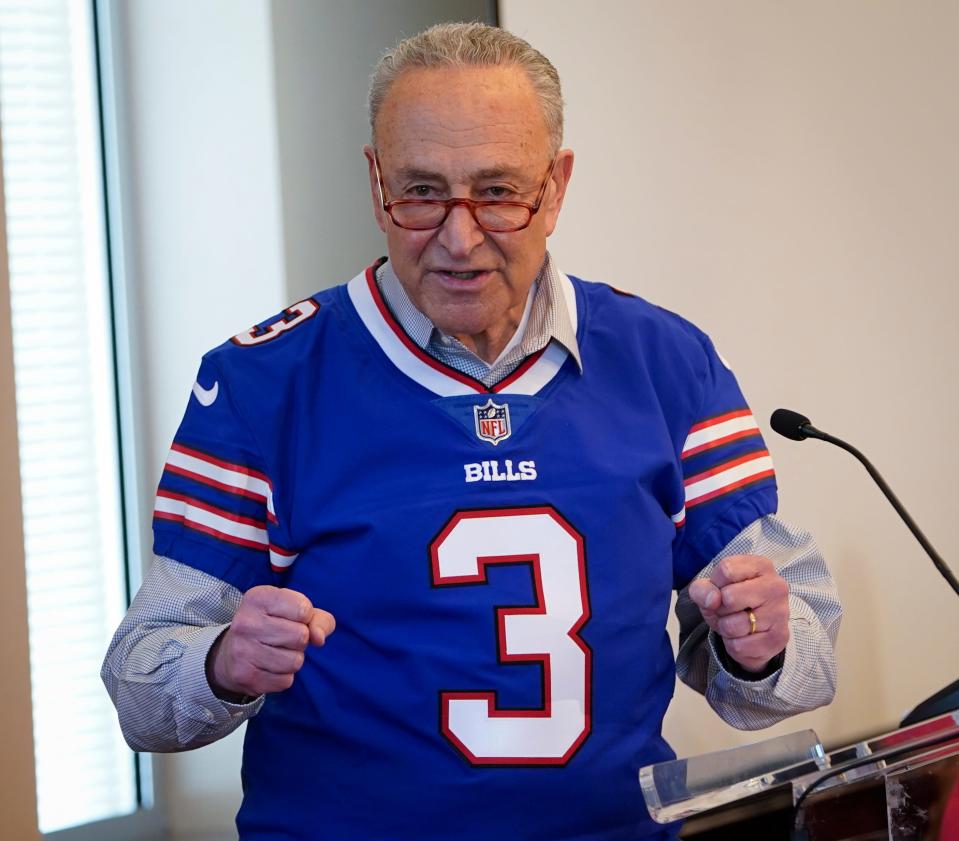Damar Hamlin, families who have lost athletes advocate for bill to fund AEDs, training
WASHINGTON ― Buffalo Bills safety Damar Hamlin added his voice to a room full of fighters on Wednesday.
The Capitol Hill event, held to promote proposed legislation called the "Access to AEDs Act," brought them together from across the nation.
Among the crowd were dads who have fought for heart screenings for youth athletes, and moms who have fought for laws mandating sideline defibrillators (AEDs), like the one that saved Hamlin when he collapsed Jan. 2 during a Monday Night Football game.
Some of their journeys started two years ago, and several started two decades ago. But their crusade gained a prime-time spotlight when Hamlin's life was saved on the field that day.
They gathered on Wednesday for the common purpose of saving lives.

Flanked by three boys in suits, Hamlin introduced them as his two cousins and his little brother, ranging from ages 8 to 11.
“These kids represent why we are all here today,” Hamlin said. “Sudden cardiac arrest happens to more than 7,000 kids under the age of 18 a year in our country. Seven-thousand kids every year. The majority of the kids impacted are student athletes.”
He highlighted a problem not often discussed ― the lack of health care on high school sidelines. Hundreds of thousands of those athletes play on sidelines that lack everything from AEDs to emergency response plans.
That's why one member of Congress, Rep. Sheila Cherfilus-McCormick, D-Florida, is stepping forward with a plan. She introduced the bipartisan measure this week.

Rep. Bill Posey, also of Florida, the lead Republican sponsor of the House bill, was in attendance, as was Senate Majority Leader Chuck Schumer.
Schumer, wearing Hamlin's Bills jersey, promised to move the legislation forward in the Senate.
It would increase access to life-saving measures, such as AEDs and CPR training, with the creation of a $25 million trust fund, from which schools could apply for a grant.
“The 'Access to AEDs Act' will help ensure that schools are just as prepared and trained to respond in crisis as those on the sideline of an NFL game,” Hamlin said during the event organized by the American Heart Association.
But the bill won’t require an AED on every sideline or even in every school. That’s more than a $25 million problem. It’s a problem well known by the families who have asked for a spot at the table and for their voices to be heard while working toward safer sidelines.

Kentucky's Matt Mangine joined the fraternity of families brought together by the loss of someone to sudden death in sports. Mangine's son, Matthew Mangine Jr., 16, collapsed on a Northern Kentucky sideline on June 16, 2020, during soccer conditioning.
The school is located 7 miles south of where Hamlin collapsed at Cincinnati's riverfront stadium.
Despite Matthew's private high school having five AEDs, no one ran to retrieve one. EMS personnel delivered a shock after they arrived, at least 12 minutes later.
“By the time the ambulance arrived, it was too late,” Mangine Sr. said. “We lost our beautiful firstborn son.”
Rafe Maccarone was 15 when he collapsed during soccer practice in Cocoa Beach, Florida, in 2007. No AED was used to save him because they were locked in the school. He died of an undetected heart condition.
Rafe's teammate, Evan Ernst, who created the Who We Play for Foundation in Rafe's honor, was there for the event.
Gail Holthouse, who lost her son, Greg, to an undetected heart condition ― hypertrophic cardiomyopathy ― also attended, but she had wavered on whether she should.
“Just the amount to get here and the stay is the amount of one AED, plus a case and pediatric pads,” the Illinois woman said.
Mangine Sr. ended his testimony to the crowd with: “And stop. That was three minutes that it took me just to deliver those words. When you suffer a cardiac arrest, if you get an AED on in three minutes, that person’s chance of survival is 89.8%.”
It’s a chance his son never had. He looked ahead to where Damar Hamlin sat, then walked away from the spotlight.
This article originally appeared on Louisville Courier Journal: Damar Hamlin, families who have lost athletes advocate for AEDs

 Yahoo Sports
Yahoo Sports 